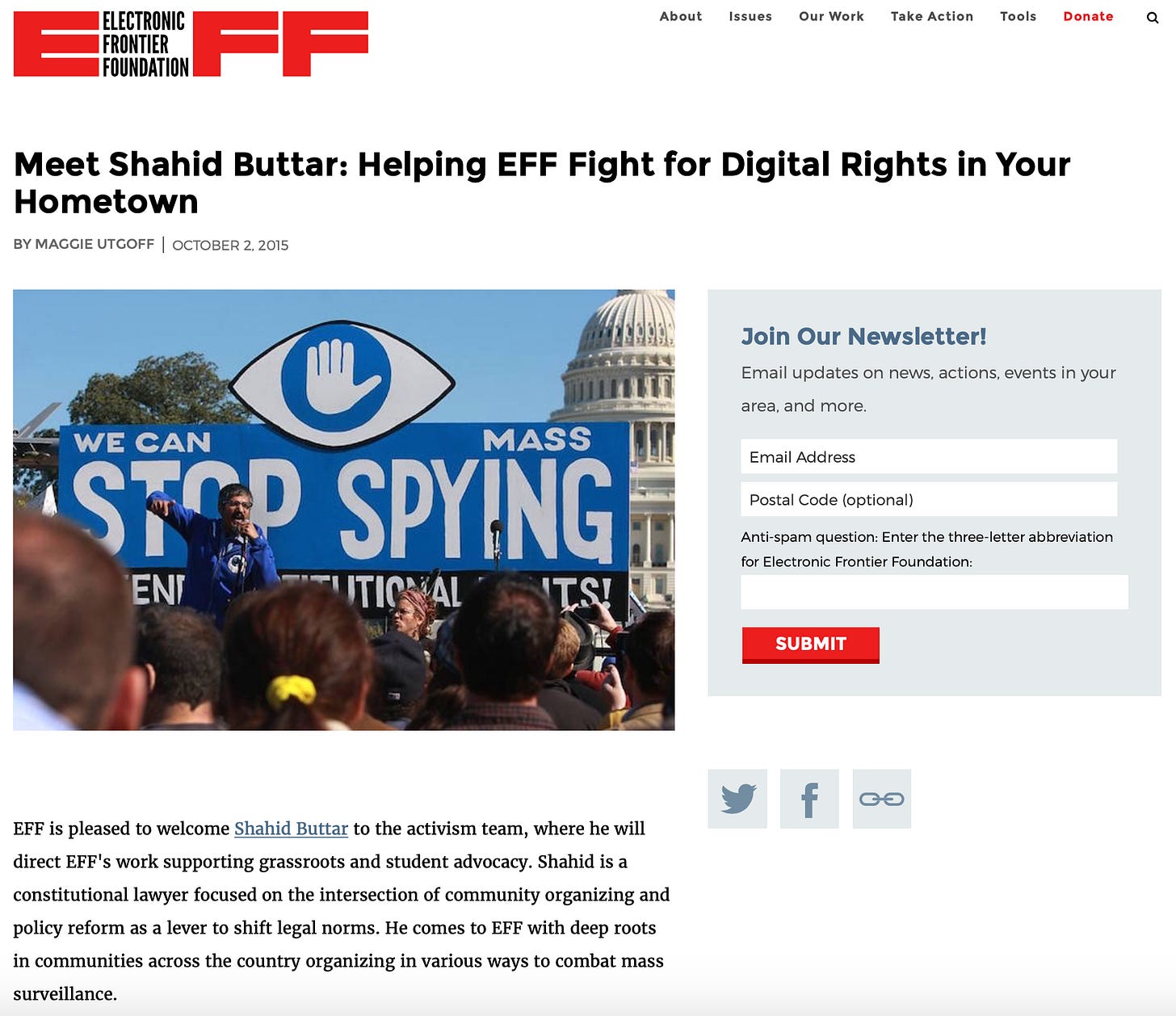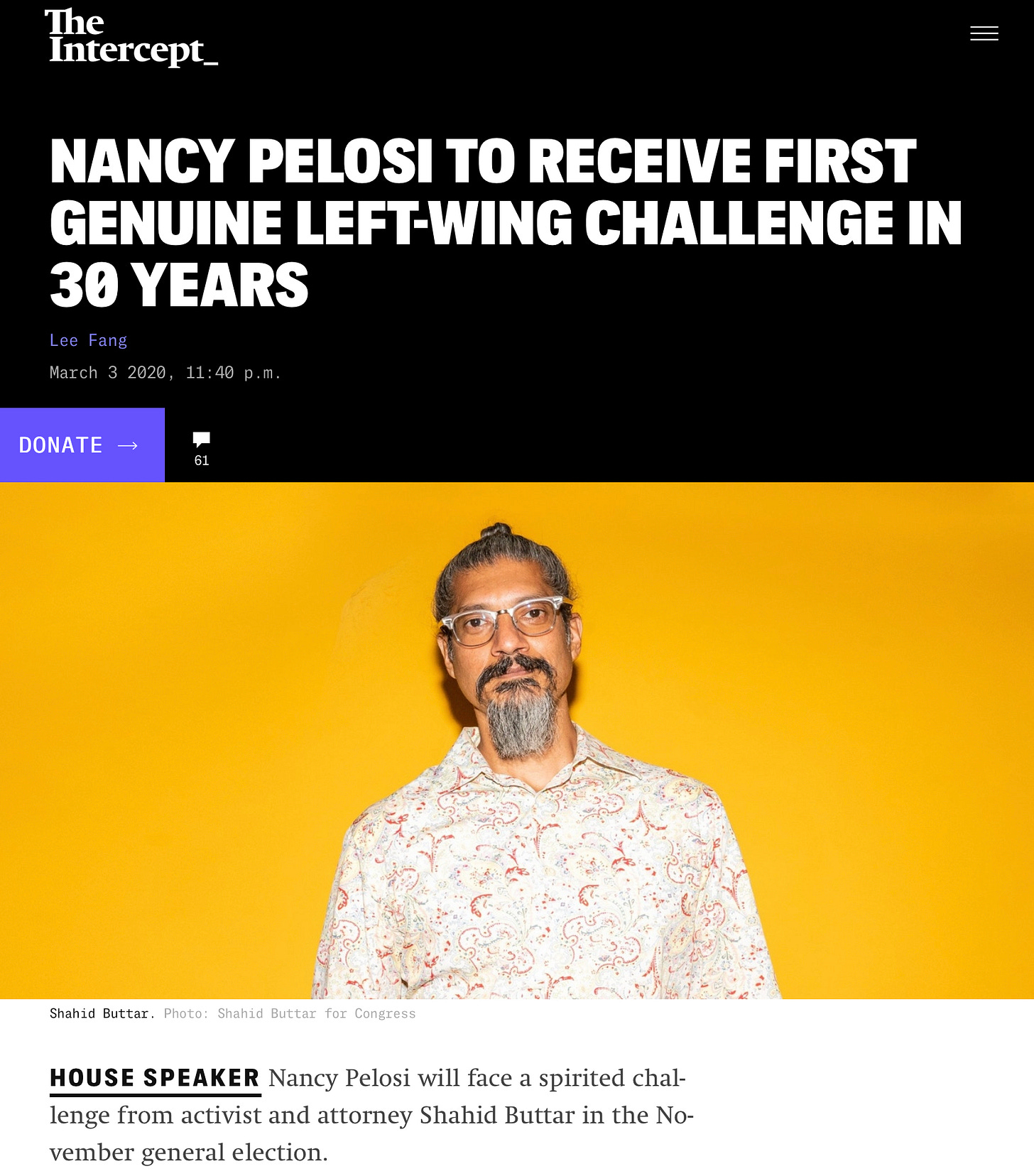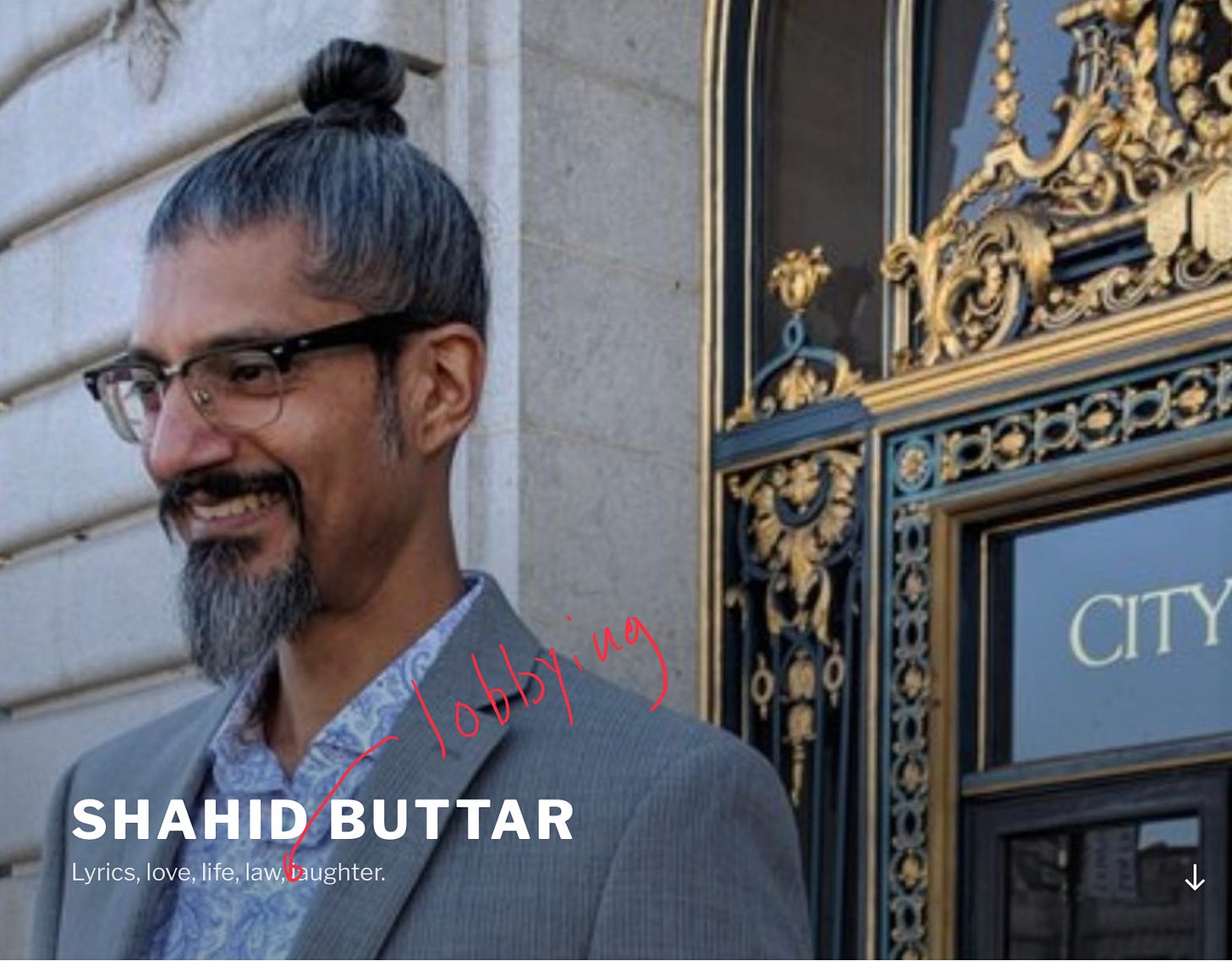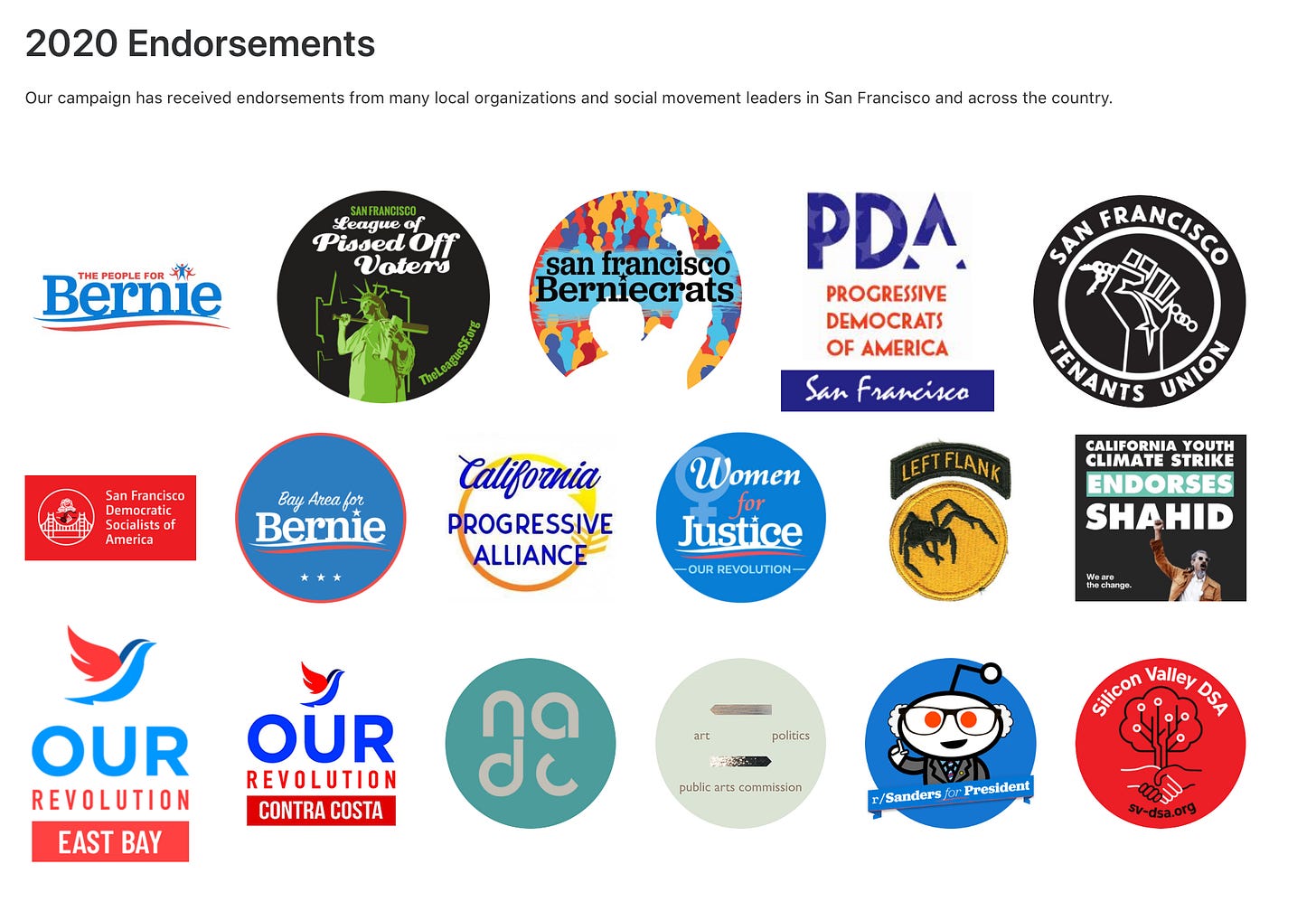Shahid Buttar, the cheesy Silicon Valley astroturfer challenging Nancy Pelosi from "the left"
As someone who grew up in San Francisco and wrote the book on the shady history of Silicon Valley — I simply can’t let this go. I mean, check it out: Turns out that the guy running to unseat Nancy Pelosi from “the left” is a corporate Silicon Valley astroturfer from the Electronic Frontier Foundation.
His name is Shahid Buttar.

EFF
Why is this significant? EFF is America’s oldest and most influential internet business lobby — an organization that has played a pivotal role in shaping the internet as it exists today. That privatized telecommunication system that’s owned by giant monopolies, powered by for-profit surveillance and influence ops, dominated by spies, and lacking any democratic oversight? Yep, that one. EFF is directly responsible for bringing it into being — and for making sure it stays privatized, shitty, and oligarchic.
As I wrote in my massive investigation into EFF’s shady history and it’s pro-Silicon Valley astroturf tricks for The Baffler a few years back, this organization has done an amazing job convincing us that it’s one of the good guys on the Internet — that it’s grassroots and on the side of the people. In reality, EFF has always been on the side of corporations, fighting against democratic control of Silicon Valley — from making sure ISPs could grow into giant monopolies to blowing up the first (and only) attempt to regulate Google’s surveillance business model back in 2004.
EFF is bankrolled by Silicon Valley megacorps. It’s taken millions from Google and Facebook. Palantir, the privatized spy data platform, has backed them. So has Pierre Omidyar, the rapacious libertarian tech oligarch who owns The Intercept. Hell, Google co-founder Sergey Brin’s personal foundation alone gave EFF at least $1.2 million.
Big industry support goes back to the origins of the organization. As I wrote:
The idea for EFF was hatched in 1990 by two millionaires, software mogul Mitch Kapor and John Perry Barlow, songwriter for the Grateful Dead and the wealthy heir to a ranching estate in Wyoming. Barlow, who died earlier this year, is today best known for penning the “Declaration of the Independence of Cyberspace,” a barely comprehensible but much-applauded rant against the evils of government influence over the internet that he typed out on an Apple laptop in some posh hotel in Davos…
The eureka moment occurred on Barlow’s ranch in Wyoming. As he later recounted it, Kapor’s “bizjet” was en route to San Francisco and was going to fly over Wyoming anyway, so the tech mogul suggested they meet up. “He called me from somewhere over South Dakota and asked if he might literally drop in,” wrote Barlow. “So, while a late spring snowstorm swirled outside my office, we spent several hours hatching what became the Electronic Frontier Foundation.”
EFF officially launched in the summer of 1990, a few months after the Kapor-Barlow rendezvous in Wyoming. From its very first days, it had deep pockets and big-name support. Apple cofounder Steve Wozniak offered generous financial backing and joined the board of directors, which was already packed with luminaries like Stewart Brand and Jaron Lanier, the inventor of virtual reality tech. EFF’s public relations was handled by Cathy Cook, a whiz who had done the same work for Steve Jobs. In short order, this young hip watchdog group—which in Kapor’s words was launched to “find a way of preserving the ideology of the 1960s”—lined up lucrative corporate sponsorship from monopolies and giant corporations like IBM, AT&T, Microsoft, MCI, and Bell Atlantic.
In short, EFF is a corporate lobbyist. Always has been.
Which brings us to Shahid Buttar, the guy running as a “left-wing” alternative to Nancy Pelosi, the They Live Congresswoman from San Francisco: He’s been working for EFF since 2015. And not just in any capacity, but as a “Director of Grassroots Advocacy.”
If you translate that from lobbyist jargon, it means his job has been to take the outfit’s pro-corporate campaigns and dress them up as grassroots “for the people, by the people” movements. His job has been to trick people — to astroturf. Which is what he did in 2016, when he ran a ridiculous astroturf campaign that convinced people to protest in front of Apple stores around the country in defense of Apple. That’s right: in defense of Apple, one of the richest and most powerful corporations in the world. (For more info on this EFF “protest,” check out the first part of my Baffler story.)
I use the present perfect here not by mistake. According to recent reporting, Shahid hasn’t quit EFF. He’s simply taken a break to run his campaign. Technically, he’s still a lobbyist. A lobbyist on leave.
Imagine if someone took a leave of absence from, I dunno, say, Charles Koch’s Cato Institute or FreedomWorks to run as a “left-wing” candidate and got nothing but praise from left-leaning journalists?
That’s what been happening here.
Shahid’s been treated like a savior by what seems like the entire prog and left-wing journalism and podcast circuit. One good example: The Intercept’s Lee Fang wrote a ridiculous puff piece on Shahid. Lee called him a “genuine left-wing challenge” to Nancy Pelosi, yet omitted any critical discussion or inspection of his ties to EFF. Can you even be “genuine” and “left-wing” if you work as a Silicon Valley astroturfer? I doubt it.
As a side note: There’s a major conflict of interest in Lee’s lazy boosterism. The billionaire owner of The Intercept has backed EFF financially and benefits from org’s lobbying — something that in the very least Lee should have be disclosed. But Lee didn’t.

So how “left-wing” is Shahid?
Listening to his interviews, he touts his Stanford law school degree and constantly talks about the “rule of law” and “defending the Constitution.” This is how he described his politics to Michael Brooks: “Freedom and liberty are not abstract concepts to me. As you know, my view towards the First Amendment reflects this, I would say, deep-seated patriotism.”
The Constitution? Deep-seated patriotism? Not things you usually hear a leftist gush about…
As far as his official campaign materials go, Shahid appears to hit all the right Bernie-type points: Medicare for All, reduced military spending, the Green New Deal. It’s all a bit tepid and cautious, but in line with the left-liberal politics of a new, younger Democratic Party wave.
But when you look at the part of his platform that impacts Silicon Valley, that’s where things start to get interesting — and where his corporate attorney-lobbyist side starts to shine through.
Silicon Valley has always seen even the tiniest regulation of its private, for-profit surveillance (aka “data collection”) as a major threat. Right now, there are no limits on the kind of information that big tech collects, nor are there any checks on how companies can put that information to use. And the industry wants to keep things that way. Which makes sense: For many Internet giants, surveillance is a major part of their business model. It’s the base on which their corporate and economic power rests.
For years Silicon Valley has successfully fought off every attempt to regulate its for-profit surveillance practices. And EFF has been on the frontlines of this war.
The lobby outfit’s main tactic has been deflection and redirection.
EFF has worked overtime to shift people’s attention away from corporate surveillance by focusing on the big bad government. In one legislative and PR battle after another, EFF has zeroed in on government surveillance and espionage to the exclusion of everything else — putting all of its considerable energies and reputational currency into redirecting people’s concerns to an arena of conflict that poses no real threat to Silicon Valley’s core business interests.
Want to limit NSA surveillance powers? Sure. Google and Facebook and Apple and Amazon don’t care. They’re on board. They’ll even throw in some cash. Just don’t touch the prerogative of our tech overlords to spy on and manipulate us in whatever way they please. That’s blasphemy!
That’s why the EFF has been so happy to campaign against the NSA and FBI, while playing down every single private sector surveillance scandal. It’s good for business.
From what I can tell, Shahid’s has more or less replicated this basic lobbyist strategy in his campaign for Congress.
In his interviews, he has put the government at the center of what’s wrong with Silicon Valley. To him, the U.S. National Security State is the main problem because it has “coopted large tech firms” and turned good platforms into bad surveillance machines. I’ve constantly heard a version of this argument from cyber-libertarians and Silicon Valley boosters: Government bad. Corporations good. Get rid of government and the market will calibrate Silicon Valley back to maximum levels of liberty for all.
On two of the issues that have a direct bearing on Silicon Valley — privacy and digital rights — the political vision Shahid lays out reads like it was lifted straight from the EFF’s guide to lobbying.
He says nothing about regulating or changing Silicon Valley in a way that makes it more democratic or accountable to the public. Instead, he focuses exclusively on limiting government surveillance. The only thing he does say about a concrete law that regulates the private Internet is to praise and seek the full restoration of Section 230 of the Communication Decency Act, a tricky corporate carveout that has has been reinterpreted over the years to give powerful Silicon Valley companies immunity from all sorts of legal liability. Not surprisingly, EFF has been one of the main players fighting to preserve the deregulatory power of Section 230. In fact, it’s one of the organization’s biggest causes.
Focus on the government; leave Silicon Valley alone. As far as I can tell, that’s Shahid’s politics in a nutshell. Not very “left-wing,” but a great fit for an attorney who works for the world’s premier Silicon Valley lobbyist.

Source: Shahid Buttar personal webpage.
The most depressing thing about Shahid is that he’s probably like most people who work for EFF and adjacent digital lobby groups: so thoroughly propagandized by Silicon Valley’s corporate ideology that he doesn’t even see it as lobbying. To him it probably seems like good politics!
That’s how all-encompassing the industry’s influence on our culture has been. It’s so pervasive that most people don’t notice it’s there. And that helps explains why a tech lobbyist like him has been able to so easily slip into our left-wing media and political world without raising any alarms. All that Shahid had to do was to say he supported Bernie and Medicare For All and everyone immediately cheered him on. And I mean everyone. He’s been endorsed by Susan Sarandon, Cornell West, local Bay Area chapters of the DSA, and all sorts of associated Bernie Movement institutions.

It’s all a bit depressing. So before I go, I want to leave you with something special: Shahid doing a bongo rap set against the NSA. It’s from 2013. And it’s lit, I promise you.
The NSA breaks the law everyday
It doesn’t matter who you are or what you say
Speak it, brother! You can tell this segment is vintage because Shahid hadn’t yet grown out his cheesy lobbyist man bun yet.
—Yasha Levine
Source: Breaking the Set, 2013
PS: As I was working on this letter, an acquaintance of mine who’s long been active in Bay Area left-wing politics wrote to warn me about him:
“This guy is a total fake. San Francisco has a huge, longstanding activist scene. This guy comes out of fucking nowhere to represent the SF left. Nobody knew him and he was never politically active in the city other than this EFF shit. But because he had this slick idea of ‘challenging Pelosi’ all these people were tricked into giving him legitimacy.”
Then there’s Artist Rights Watch. They do great work and they also think that Shahid’s ties to Silicon Valley raise serious questions about who he’s really serving.
So not everyone’s been taken in by Shahid’s act. Still, the critics are few and mostly silent. Support for Shahid has been overwhelming. What does it say about the post-Bernie Movement? Nothing good, I’m afraid. Sure Nancy Pelosi is horrible, but that doesn’t mean people should throw their support behind a corporate lobbyist as if he’s some sort of radical savior, just because he signs onto a few progressive promises.
Subscribe to Immigrants as a Weapon and get access to member-only notes and letters.



I watched his interviews on Michael Brooks and Sam Seders shows and they were both drooling over him, but as soon as I found out he did some woke bongo raps I knew that there had to be more. I had heard Brace form TrueAnon mention what a huckster her was and I'm glad you have written this piece to shed some light on his shady past work. I think you make a great point about him being so propagandized that he truly believes he just has great politics. In his majority report interview the way he gushed over constitutional law and the courts really gave me a bad taste. Thanks for all you do Yasha, this is extremely important work.
Hey Yasha I support your work (literally). For those of us who came up through Silicon Valley, we did go see the IETF as sort of a model of what govt could be (want to make policy, join a working group, show up and be ready to be eviscerated by some smart people, don't show up unprepared, etc). I don't see why you didn't interview Shahid. I am a busy person I run a small business, I have not had time to go through all of Shahid's ideas, but I do not think he is a sell out. If I was you I would have interviewed him. If you want to interview him let me know and I imagine it could happen. Your indication that he is not our savior is fine, but "show me your friends and I'll tell you who you are". There are a lot of smart people working with Shahid, and he shows up. I ran into him at almost every critical protest and gathering. He works closely with the Sunrise Movement. I've got to say, are you suggesting people NOT vote for Shahid vs Pelosi? Shahid is 1000 times better than Pelosi. He's who we've got - and he's got a shot. I was not prepared to defend him today, to me it is night and day. People vote Shahid. And tell him what you want. I am sure he'll listen. Best Regards.